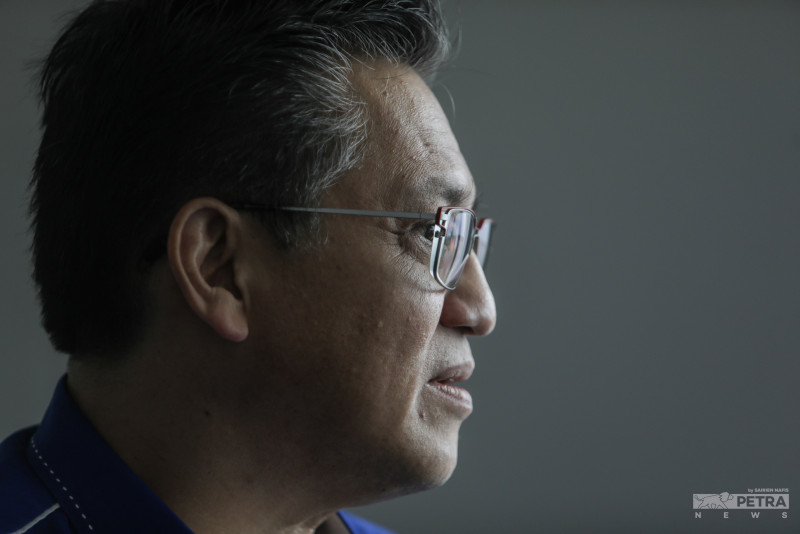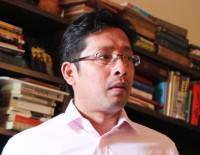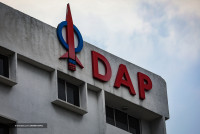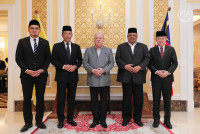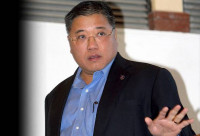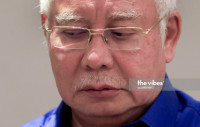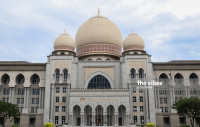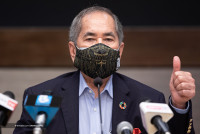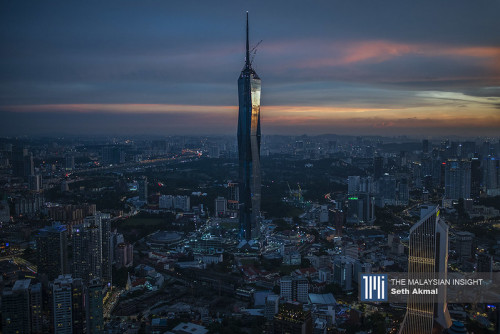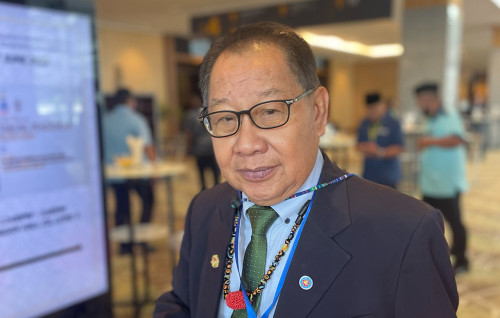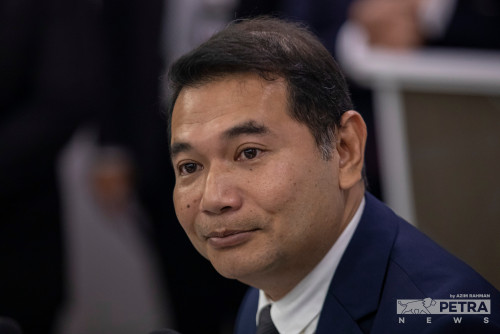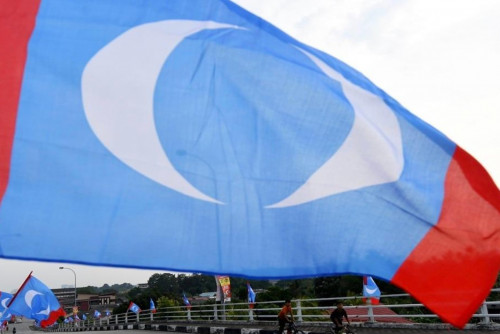KUALA LUMPUR – In an exclusive interview with The Vibes, Johor Umno deputy chief Datuk Nur Jazlan Mohamed, who is a former deputy home affairs minister, spoke candidly about the forthcoming state polls on March 12, why Umno/Barisan Nasional is still the “tried and tested” choice, and why “rejuvenation” is crucial to getting Malaysia’s politics on course.
Eddin Khoo: It appeared that former Johor chief minister Datuk Hasni Mohammad was running a fairly stable administration in a politically fragile state – Johor. What really lay behind the breakdown in consensus that brought the state to this election?
Nur Jazlan Mohamed: Still waters run deep. In Johor’s case, the surface looked good because Hasni was able to manage his fragile majority, accommodating the demands of both Pakatan Harapan (PH) and the Perikatan Nasional (PN) side – unfortunately, it became too much.
Following the death of the Bersatu assemblyman (former menteri besar Datuk Osman Sapian), the arrangement was made unworkable. It was a 28v28 situation, and that came to the fore during the last tabling of the budget in which the speaker would be the one to cast a deciding vote. You can’t let such decisions be left to just one man.
So it was better to go to the sultan, ask for a dissolution of the state assembly, and give a much clearer path for the next government to focus on the next steps in coming out of Covid-19 and getting the economy going.
But the economy can’t go smoothly without political stability, and that’s why Hasni went to Tuanku to ask for the state assembly to be dissolved, return the mandate to the people, and see what happens.
And we (BN) are confident about forming a government on our own.
EK: This idea of “stability” – what some are thinking is that stability can come with proper arrangements and negotiations. Why is there a need to dissolve the state assembly rather than finding ways to work? Isn’t this notion of “stability,” given the contemporary state of our politics, just wishful thinking?
NJ: Not if you have a working majority in the state assembly coming from your party – a single party. If you have a situation where you have so-called equal partners forming a government, it doesn’t work.
Bersatu put up two menteri besar during PH’s time. The first was sacked by (then prime minister) Tun Dr Mahathir Mohamad himself; the second was replaced by Hasni so that (Tan Sri) Muhyiddin (Yassin) could take up the prime minister’s job! So, he sacrificed his own man to take the prime minister’s position.
They (Bersatu MBs) faced the same issues – party negotiations, economic challenges. But Hasni had one extra problem – Covid-19 – and in that sense, it just got too much.
How do you work through the situation? Because at the end of the day, you need stability. Meaning that Hasni can manage the state with the support of like-minded state assemblymen from his own party, instead of this mix-match coalition which failed at the federal level, and which also failed in Johor, of course.
EK: So you are confident what happened recently in Melaka can be replicated in Johor, though the electoral terrains are really quite different.
NJ: Terrains are different, yes, but Melaka is also a southern state, our neighbour state. It has a mixed population, a mixed religious population, too, and they don’t like PAS. Since PAS is with Bersatu in PN, I think Johoreans are going to reject PAS/PN.
EK: That seems to leave the voter with a beggar’s choice.
NJ: Voters, nevertheless, have to choose a government. Having ruled the state of Johor for 22 months, PH failed. PN has also failed, but BN (Barisan Nasional) is still here, and the voters have to make a choice of government irrespective. I think BN offers the best choice with a proven track record.
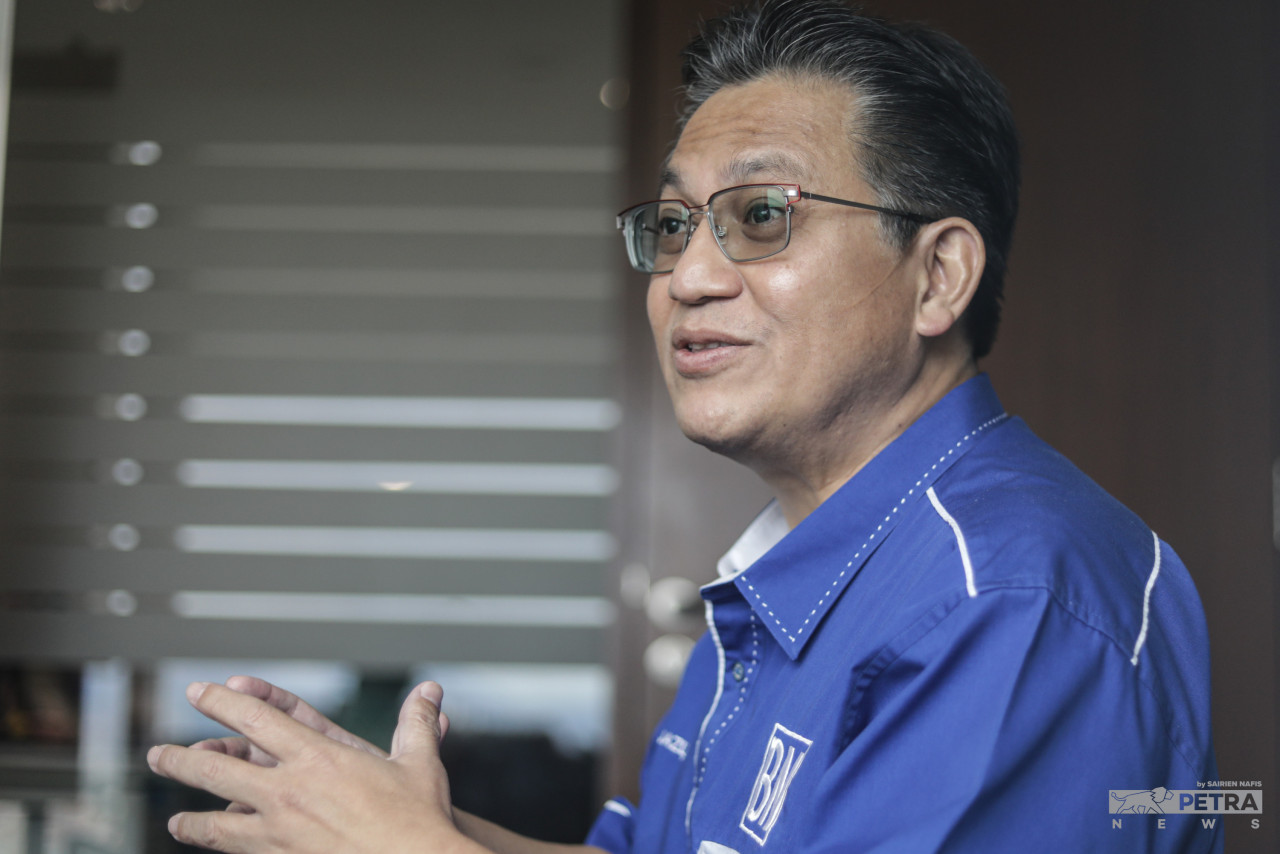
EK: There are observers who perceive these elections as having less to do with BN than with Umno carving a return to power. Where is BN today? BN, as part of the governing arrangement today, is very vague.
NJ: When BN was in power, we ran the government reasonably smoothly, because both the federal and state governments were aligned under us. It became a bit of a mix later at the federal and then state levels, when we began to have coalitions, which were changing at both levels.
Now things are firming up – Perak, Melaka, and Pahang are under Umno’s leadership. And Johor, I am quite confident, will be back under Umno’s leadership. Once we have the state assemblies under one firm leadership, then we will begin to solve the situation at the federal level.
EK: One of the challenging aspects of the Johor elections is the population demographics. What makes you think that MCA and MIC have the potential to pull back the non-Malay vote?
NJ: They (MCA and MIC) will still largely depend on the Malay vote, but we (Umno) will be giving them a safe haven for them to recuperate. 2018 was our lowest depths; MCA got only 5% of the support. It can’t possibly go any lower, so if it has an upside now of 5% that is already double what they had before.
Of course, Umno will give them the votes and space to recuperate, but we don’t expect the non-Malay votes to be conclusive. The non-Malay votes have gone to the maximum. The vote has been exhausted, and because politics is a pendulum, we can expect it to swing back to us.
So, I do think MCA and MIC will do better.
EK: What is your strategy of rapprochement for the non-Malay vote?
NJ: Think about your pocket, (your) family; think about your jobs and businesses. Enough with the experiment, because the experiment has turned out to be a dreadful experience these past four years, compounded by Covid-19.
So now, let’s focus. Look at this issue of “kluster mahkamah” (court cluster) which is being played up. Dr Mahathir and Muhyiddin have run out of ideas; they haven’t presented a case for them to prove they are a capable government. In terms of politics, they are all over the place.
PH is practically gone; they haven’t presented anything of any worth. As for PN, look at the performance of their ministers. My God! I think Umno ministers are shoring more capability and credibility than those from PAS and Bersatu.
So it is time for people to look at the facts. Kluster mahkamah is used as an issue to confuse people.
In the Johor election, they (court cluster) are not even contesting, and even if the likes of Dr Mahathir says giving BN victory in Johor would signal a return of kluster mahkamah…eh, this is the Johor election. The general election (GE) isn’t even here yet. When GE comes then, we will see if the kluster mahkamah stands.
And by the way, please remember, Muhyiddin also became PM by getting SDs from the very people he calls kluster mahkamah…so, where is the morality there?
EK: Datuk Seri Najib Razak has been in Johor campaigning fervently for Umno/BN. You were quoted as saying he is very much needed there. What is your – and Umno’s – real position on persons who have been found guilty by a court of law?
NJ: I simply follow the people. I was surprised to see Najib get so much response while going on walkabouts. I see it with my own eyes. People come up to him – Malays, Chinese, Indians. I asked him to explain it, and he said: “Just a few years ago they were all running and turning away from me, but now they come to me and shake my hand.” So the people seem to have – I wouldn't say forgiven him – but they look upon the Najib administration with nostalgia, where they had more than what they have today.
Maybe that is why they feel they still need Najib in their lives, though maybe not as PM. But he certainly has the experience, can come up with an economic plan and everything, which the alternatives can’t do.
EK: Doesn’t the party have an ethical stand on this?
NJ: In any country in the world, politics is about what the people want. Morality only goes so far if there are no alternatives, and in Malaysia, as has been proven the last four years, there is no alternative to Najib. The question then is: what role is he going to play? I don’t think it is going to be as PM. I think it’s going to be as a loyal party member that supports the party.
EK: You made an interesting remark earlier – “we need alternatives”. Are we short of “alternatives”?
NJ: Oh yes. Look at PH – they gave people hope, failed miserably, and now are split again and trying to shift the attention from their failures to Muda – a bunch of young, untested kids.
We have one among Muda who was a minister in the previous administration, but who in the view of quite a few did not do well in the ministry (of youth and sports). He is still sending the same story of “hope” without any capacity to deliver.
So the question is: who has the track record and the people to deliver all these promises? It is still BN. It may not be good in some people’s minds, but it is still the best available.
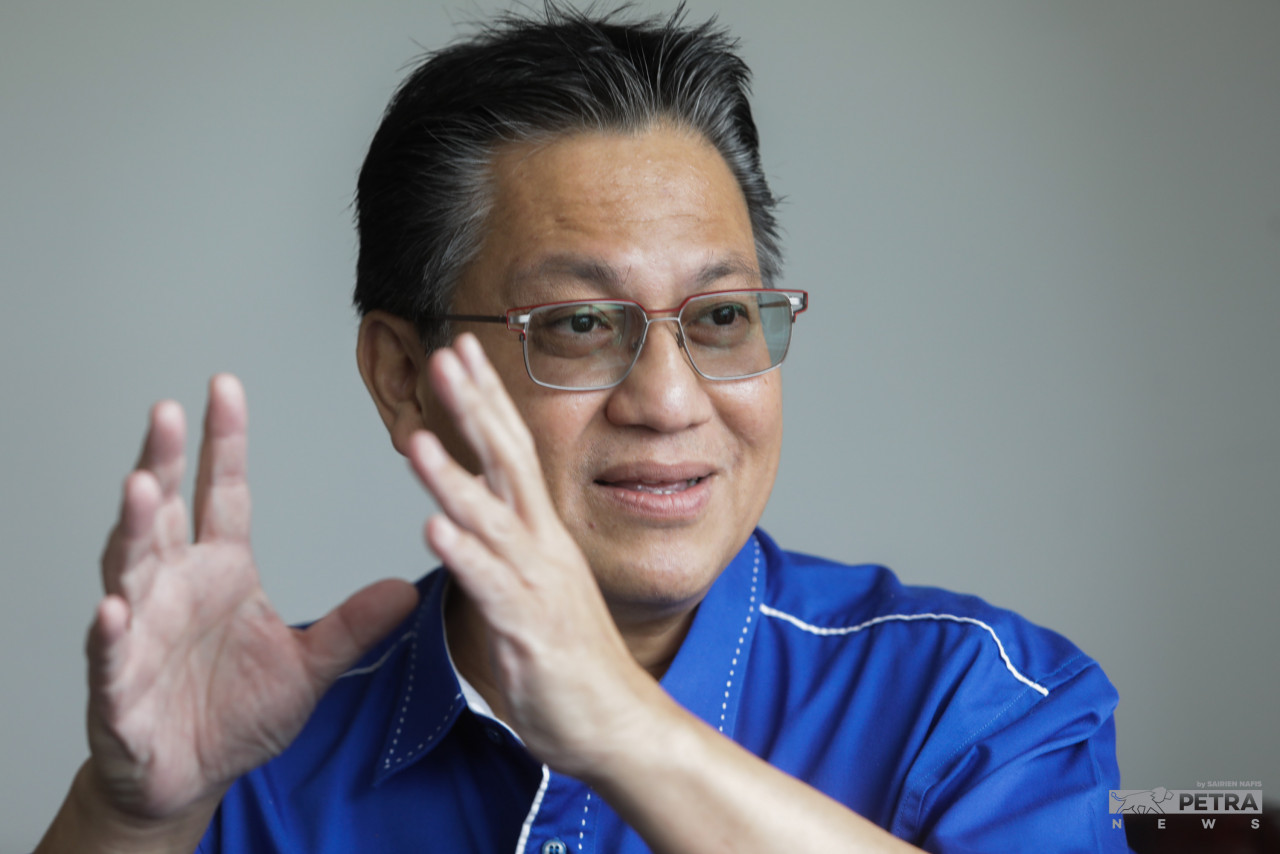
EK: What has the psychology of Umno been since the events of 2018, principally in introspection about what reforms need to take place within the party?
NJ: I think we have adjusted very well, in the sense that we have new people at the front lines now. The question now is how we begin the transition from Najib and Zahid to these people. Who is going to become the bridge, and who will become the future?
I believe the raw material is there, but we need to get the power first before we can drive what we can do. If we are still going to be stuck with the perception that the whole of Umno is corrupt, and the focus is on these few people – and remember it is only these few people since Umno has many others – we are not going to move forward.
Then on the other side, the alternatives on offer are still Dr Mahathir, (Datuk Seri) Anwar (Ibrahim), Muhyiddin and, God forbid, PAS…well, voters have to make their decision.
I give you the example of Johor – the reason why Johor was successful is due to longevity in terms of political stability.
Johor Baru, for example, was the only city in the whole of Malaysia that had not fallen to the opposition until 2018. The reason for this is that we at Umno have managed to have a good rejuvenation programme. We have had that record of putting forward new leaders and therefore advancing a new generation.
It has been a good rejuvenation programme with good capable leaders, tried and tested through the various layers of Umno. Not like today, where people are thinking they can just take somebody young and put them up without undergoing this training.
We in Johor don’t do that, and that is why I am confident that people in Johor will have the confidence to put their emotions aside and look at what the facts are. And the fact in Johor is that we have a slate of leaders – and young leaders too – that can take over and run the state immediately.
EK: Since that is the case, why is it that while Umno has young leaders, it appears the old guard still has a monopoly over decision-making?
NJ: For the moment, that is true because of the hierarchical nature of the party, but the loyalty is there (in Umno), which is missing with the other parties.
(Datuk Seri) Azmin (Ali) was the main mover in PKR, and he left to join another party. (For Datuk Seri) Hamzah Zainudin – it was Umno that brought him up and made him somebody, but when he saw the opportunity, he jumped over to Bersatu.
Bersatu is not an organic party. There is no loyalty; they don’t sit on strong principles. But in Umno, we have managed to stay intact even though we have lost power and been forced to adjust – very well, I might add – to new circumstances. Part of the reason for that is that we have an older generation of leaders within a structure of loyalty that holds the party together.
The question is whether they want to continue, or give way, and I am saying I think they will give way – and they will give way, because they want the party to continue.
Umno is not about individuals; Umno is about membership, and that is where the other parties fail.
EK: One of the principal problems for Umno is the image. The party is so associated with largesse and money. How do you think the party has been able to rehabilitate itself from that image?
NJ: The loss of government, the loss of privilege, and with that, the loss of largesse has had a big impact.
In the last few years, I think party members have adjusted to things. The Melaka election was frugal in the way it was run because we just didn’t have the money. Members who worked on the ground actually worked voluntarily, which had not happened in a long time. We were so lavish before, but in Melaka party members worked frugally.
In Johor, it is the same – we are working on a tight budget. It is the party members who want to see the party come back. It might not be visible to the public, but to us in the party, it is a good, positive change.
EK: This generational transition – can’t Umno do it faster?
NJ: Umno is a monolith; it is not easy to shift. It is a party based on members. Pejuang, meanwhile, is a party based on personality. Bersatu is a party based on personality.
PKR is a party based on personality, though they did evolve, but are now breaking apart again. DAP say they are not a party of personalities, but I think otherwise, and remember that (Lim) Guan Eng is also part of the kluster mahkamah. Muda is a personality-based party, and Syed Saddiq (Syed Abdul Rahman) is also part of the kluster mahkamah.
That’s why I was going on about alternatives, and the lack of them. People truly have to be objective now, push emotions aside, and make your choice. Despite hating BN or Umno for decades, you now have to see who will be trustworthy enough to lead the government.
EK: It seems you are simply saying Umno might be the best of the worst. That is not a good position for the country to find itself in.
NJ: I wouldn’t say that. All I am saying is that we are going through a difficult transition. We used to be second in Asean some thirty years ago; we are now down to fifth or sixth.
Johor used to be the second largest economic generator in Malaysia after the Klang Valley, second or third in terms of attracting foreign investment. Now it’s number eight.
We are going through a situation where, because of over-politicking, no one is concentrating on the real business of running the government, creating economic opportunities, and managing wealth. Once we clear the matter of political stability, then we can focus on important things like the economy.
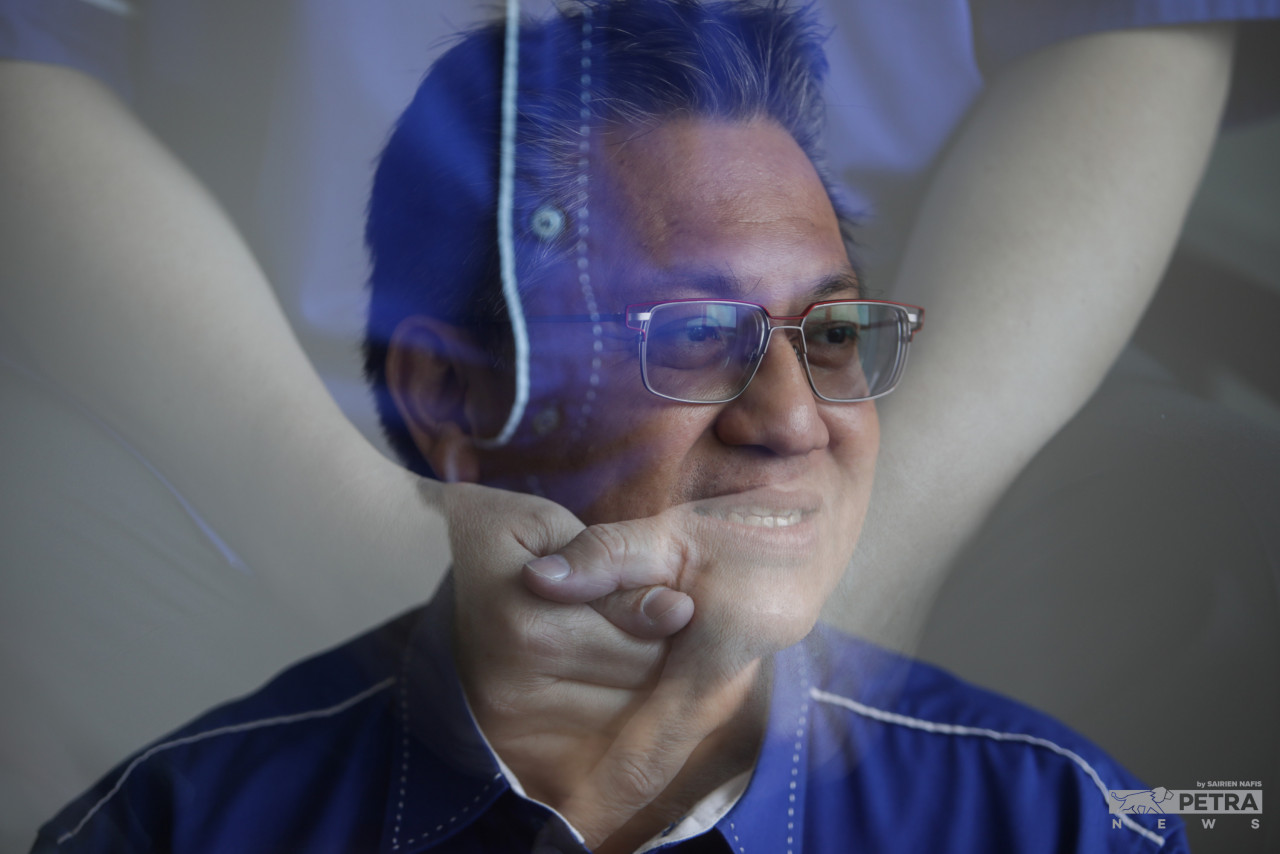
EK: What have the preoccupations of the essential Umno base been since 2018?
NJ: Oh, the soul searching has been heart-ripping – from once being lavish, we are now operating on a frugal budget. From the attitude of “we are supreme”, to “now we are humble”. From being show-offs, we now have a far more down-to-earth attitude. And this goes down from the top to the bottom: the realisation of loss was great to us.
EK: You have been very firm in your rejection of any kind of working relationship with PAS in the state election in Johor. What is the future of Muafakat Nasional (MN)?
NJ: Muafakat was killed by (Tan Sri) Hadi (Awang) himself. When they were in opposition with us, the way for them to come back was to have that Muslim-Malay narrative. They met with us and they said, “let us do this”, and we did.
When Muhyiddin came to power, they did so as well, running along his coattails. And then when he (Muhyiddin) wanted to split us up and offered this idea of a Perikatan Nasional, they went with that idea instead.
This opportunistic attitude, plus the fake persona they have, make MN unworkable. I remember I made a statement – I was attacking PAS, and Hadi came up with a response saying: “Umno people, don’t listen to your grassroots leaders, just listen to your top (leadership).”
This is what PAS actually is – it is a cult, a top-down structure, because they have their walak, their sumpah, which is a pledge to who, I don’t even know…
Even though they say they are a democracy, they are in fact not, because in real terms the ground can say something, but they will all follow the walak.
Umno is not like that. We are a party of the grassroots. The decision to break away from PN came from the grassroots up. So, you see the difference – top-down, grassroots-up.
MN was a marriage of convenience because PAS wanted to be relevant, but once they got power and tasted it, they were swept away – despite their incapable ministers – and they decided to go with the duniawi (worldly) benefits.
EK: Malaysia is a country of political alliances because of the essential demographics. The present situation does not augur well for the politics of alliance. Is Umno already open to new alliances post GE-15 with unconventional partners?
NJ: Why not? Though, of course, we would prefer to win outright.
EK: Which would be quite impossible.
NJ: Yes, but at least it will be an alliance of equals led by a dominant partner. This “equal numbers” alliance, it just doesn't work. That has been tried already, under PH and also under PN.
Maybe I just want to reflect on history a little: why did Barisan Nasional come into being? May 13, 1969. Before that, it was Perikatan (Alliance). When May 13 happened, Tun (Abdul) Razak did a noble thing, for which he is still remembered today, and Najib is also a beneficiary of this memory.
Tun Razak selflessly brought everyone together until BN was formed in 1974 – four years after the Emergency ended in 1970. The idea was to bring everyone under one roof. Even Sabah and Sarawak were brought into the picture, sacrificing their federation status and coming under the fold of a peninsular alliance with Umno leading it.
The only party that did not join the coalition was DAP. Even PAS joined for a while. And it delivered 50 years of stability.
Today, it is a mess again, and what is the catalyst to bring people together again? May 13, 1969 was a horrific event, so I hope there will not be another May 13 for people to realise that we need a strong catalyst to bring people together.
I am not being a demagogue trying to scare people. I am not! All I am saying is that BN was formed from this horrific event. It brought people together, and it gave half a century of stability. Now we are back to a pre-69 situation, and we are trying to cobble up a strong government again, which I think is not so easy. People have to have more patience, and think of compromise more.
EK: Surely you don’t see things getting further racialised.
NJ: Well, maybe…with Sarawak now seeking its federated status again, we are going back to a pre-1969 situation. Will integration, cooperation, and coalition become easier from now? I don’t think so…and with social media, people’s attention spans are so short.
It is now more difficult, and without oil resources serving as the fuel for economic development, which fills people’s pockets…in a way, it shifts people’s minds away from politics, and makes things so much more difficult.
The collapse of the BN system, meanwhile, will no longer provide the training ground for future leaders. What I am saying is, take the leaders you can get, because none of them will be tested in an empirical way.
EK: You believe our democracy is going to be very improvised from now on.
NJ: We don’t have to go very far – look at the mother of Westminster-style democracy in the UK. It’s a case of “you take what you can get”. Forget about electing a leader with a full background and a portfolio of experience – you’re not going to get it.
EK: How do you regard the possibly disruptive factors in the coming state elections – the lowering of the age of voting to 18, and movements like Muda?
NJ: We in Umno have already had a good training programme for young people, and now we have already lined up another slate of young people who can run immediately if they are given the chance.
The Muda people – it is only (Syed) Saddiq who has had some experience. And even (Syed) Saddiq, who had never been in politics before, contested, won an MP seat and was straight away appointed a minister, without knowing the intricacies of bureaucracy, culture, Parliament, and business. He had never even worked before, but was straight away made a minister.
Do the people seriously want – perhaps we can tolerate one – a bunch of people with no portfolio of experience of any kind to be in charge of the country? So, don’t be emotional about it…Dr Mahathir himself, under PH, endorsed a strategy of promising without delivering.
So, I hope people will vote objectively in Johor and not be swayed by emotions, as they did in 2018. Now is the time to be sober, not a time to experiment. The experiment has been done. It has failed, and the experiment has cost money.
EK: One aspect of our democracy is that it is expected to become more and more disruptive. Johor is an interesting state from which to raise this question: a disruptive democracy will bring into play extra political forces, such as the palace. How important is it for the palace to keep to its constitutional role, and keep out of politics?
NJ: Very. Very.
Unfortunately, if the politicians are weak, the royals will be called upon to play a more interventionist role. I have also mentioned the civil servants; they, too – if the politicians are weak – will begin to run their own kingdom. That’s not good for the country, and we need political will to dig us out of this malaise we have today.
And not to mention the religious bodies, the businessmen, our international partners – they will be confused about who is in charge. So, it is very important to do that. But we basically need to reclaim political ground again, and the royals also will then have to retreat to their traditional position, which is basically to be the last refuge for the people.

EK: Let me ask you bluntly. Can we expect the collapse of other state governments?
NJ: Again, what happened in Johor wasn’t even a political move by us. It was just that it was untenable to have the state speaker deciding on important government policy. Because it arrived at a stage where it is his vote in the state assembly that would determine things.
In Melaka, that election was triggered by PH offering the former menteri besar the chief ministership if he brought the government down, but it backfired terribly.
EK: Can we expect a collapse in Kedah since Umno-PAS relations are so fractious at present?
NJ: Well, I reminded (Menteri Besar Datuk Seri Muhammad) Sanusi yesterday that he is not an elected MB. He became MB with Umno support, as a result of the instability of the Kedah state government under PH.
If the situation there is untenable, the call is with him, not us.
EK: If Umno comes back to provide “stability” in a new alliance, what kind of characteristics can the voting public see from this historically prominent party that is different from what brought it down in 2018?
NJ: What brought BN down in 2018 was 1MDB. 1MDB is not going to repeat itself. So, we need now to basically talk about our strengths, track record and, most importantly, our rejuvenation program.
The problem with Umno through all these years is that the old ones think they are so essential that if they are not around, the party will collapse. But they continued to be around, and the party still collapsed.
So, this is what needs to be done. That means, Datuk Seri (Ahmad) Zahid (Hamidi), Najib need to be bold enough to tell these old ones – the likes of (Datuk Seri) Tajuddin Rahman, (Datuk Seri) Shahidan Kassim, (Tan Sri) Annuar Musa – who are all in their late 60s, to step down, give way. Your contribution is not going to add to our strength. Our downfall is partly due to your image as well, because you stayed too long and accumulated baggage along the way.
EK: What kind of internal bloodletting do you think that will bring about in the party?
NJ: I am confident they will step aside, because if they don’t step aside, we will force them to step aside. Enough is enough.
In 2008, I offered myself for the position of deputy chief of Umno, and who against? Yes, Muhyiddin. And my theme at that time was that rejuvenation within the party must be done immediately… It wasn’t done, and look what happened ten years later.
I knew then that I could not get sufficient nominations. There was a 20% minimum number of nominations required at that time. But today, you can just register your name and contest.
I don’t, because at the end of the day, I am already an old man. When I said that then, I was still a young man, so if I don’t follow my own principles – I am 56 now – if I don’t work my way out now, when are the young people going to go up?
EK: But surely you still feel there is a future for you in the party.
NJ: The problem is “in which role”. I look at myself as a person in a supporting role. Others, who are ten years older than me, still look at themselves in a leading role. I have less baggage, they have loads full of baggage. And if they think they should be in a leading role, they are wrong.
They should realise it is the party who made them who they are, and they shouldn’t bring the party down this way.
I am not being apologetic about the court clusters. But Najib, for whatever he has done, please look at the people’s response to him. That means he must have done something right. Yet, people keep focusing on 1MDB. The only question is whether he still wants to be in the leading role or in a supporting role. – The Vibes, March 8, 2022



